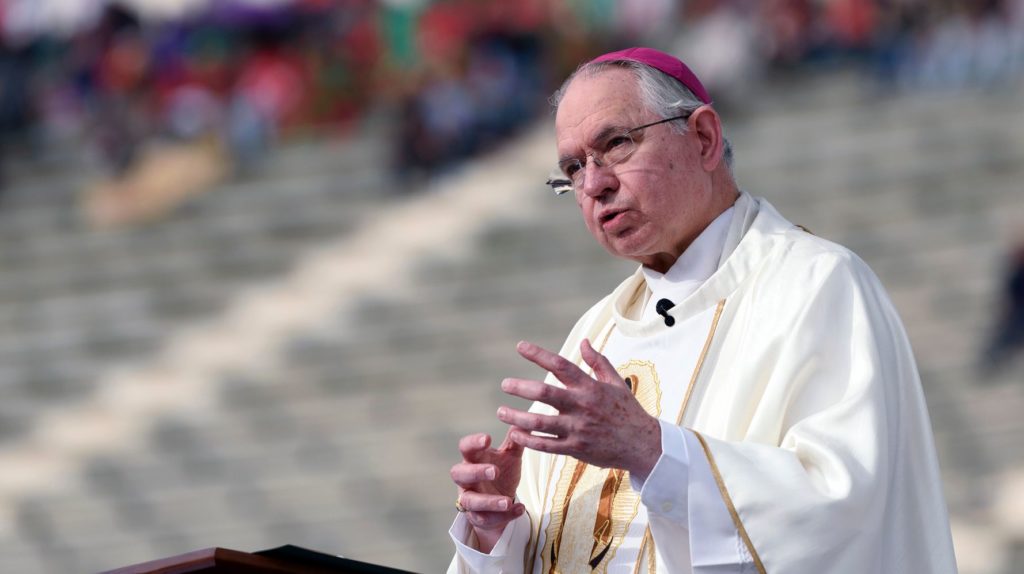U.S. Catholic Bishops voted 168-55 last week to draft a document that will likely discuss whether pro-abortion Catholic politicians should be allowed to receive Communion. The much-anticipated decision by the United States Conference of Catholic Bishops (USCCB) resulted from an overwhelming vote in favor of creating a document that more clearly outlines teaching on the Eucharist.
The document will likely reaffirm Church teaching that those in manifest grave sin are not to partake in the Eucharist. Many hope (and some fear) that reemphasizing this teaching on “Eucharistic coherence” will target U.S. President Joe Biden and other pro-abortion politicians for their discontinuity with Church teaching on the sanctity of life, and will disallow them from receiving Communion.
The document will be drafted by the Committee on Doctrine and, after completion, will be voted upon when the USCCB reconvenes in the fall.
The committee is led by Bishop Kevin C. Rhoades of the Diocese of Fort Wayne-South Bend. This is a good sign for those who wish to see Biden disciplined by the document. Rhoades has shown in the past that he is willing to discipline pro-abortion politicians for their inconsistency with Church teaching. In response to Biden being given an award from Notre Dame University in 2016, the bishop publicly disagreed saying “I believe it is wrong for Notre Dame to honor any ‘pro-choice’ public official with the Laetare Medal … since direct abortion is gravely contrary to the natural law and violates a very fundamental principle of Catholic moral and social teaching.”
The Catechism of the Catholic Church condemns abortion saying, “Since the first century the Church has affirmed the moral evil of every procured abortion. This teaching has not changed and remains unchangeable.” The Church takes this teaching so seriously that it “attaches the formal penalty of excommunication to this crime against human life.”
The Catechism also notes the special responsibility of politicians to uphold the Church’s view of abortion saying, “the inalienable rights of the person must be recognized and respected by civil society and the political authority.”
Many Catholic politicians, including the President, do not meet these criteria. Joe Biden is identified in many mainstream media reports as a “devout Catholic,” yet he remains in open opposition to the Church’s teaching on abortion. His press reporter said that “the President has been a long supporter of Roe v. Wade … he will fight to continue to protect that as being law.” He has also been under fire for revoking a Trump-era policy restricting U.S. foreign aid funds from financing organizations that provide abortions.
His and other Catholic politicians’ continued contradiction with essential Catholic teaching has led some members of the USCCB to advocate that they be denied Communion and that a policy of this kind be adopted by the whole USCCB.
The practice of denying Communion from those that are in an unworthy state dates to the early Church. As St. Paul says, “Whoever eats the bread and drinks the cup of the Lord unworthily will have to answer for the body and blood of the Lord. A person should examine himself, and so eat the bread and drink the cup. For anyone who eats and drinks without discerning the body, eats and drinks judgment on himself.” While “Pro-Choice” politicians have only been denied Communion on rare occasions, this new document could make that practice widespread in the future.
For Catholics, denial of Communion is of immense theological and salvific importance. To be denied the Eucharist is to be denied the “source and summit of the Christian life.”
It is not unheard of for priests to deny Communion to Pro-Choice politicians for this reason. For example, on the campaign trail, Biden was denied Communion for his abortion views. Similarly, earlier in May, prominent San Francisco Archbishop Salvatore J. Cordileone said that a public figure’s continued support of abortion “is a matter of persistent, obdurate, and public rejection of Catholic teaching” and that if they persist in their opposition “the only recourse a pastor has left is the public medicine of temporary exclusion from the Lord’s Table.” Cordileone’s Archdiocese of San Francisco is where U.S. House of Representatives Speaker Nancy Pelosi, another pro-abortion politician, resides.
Despite an attempt by some bishops to avoid drafting this document because they fear it would be too divisive, the bishops overwhelmingly agreed to move forward. Although the conference of bishops has not yet officially declared Biden – and public figures like him – unworthy to receive Communion, they have moved one step closer.
The full conference can be accessed on the USCCB YouTube Channel here.






Comment by David on June 22, 2021 at 6:29 am
Churches are essentially private clubs and can determine the qualifications of membership and participation. However, why institutional rebukes have to be done in a public rather than in a private manner is suggestive of politics.
If one researches the subject, it is found that a large percentage of conceptions, if not the majority, are lost before term. Most of these are within the first six weeks before the pregnancy is typically noticed. Having the wrong number of chromosomes is often the cause. The moral implications of this need to be considered.
Comment by td on June 22, 2021 at 6:18 pm
This is almost all politics from those bishops that cannot stand Biden. They don’t have the guts to try to excommunicate them. All they want to do is make a publicity statement. What the bishops are engaged in here is exactly the same as the political purity brigade and cancel culture on the left. The bishops are seeking to cancel Biden as a catholic.
But do not expect the result of this action will be to deny the president access to communion. The logical result of this will be a document that presents guidelines for when communion can be denied for an action taken by the communicant (not an opinion)- and that will take some time to hash out.
In the end it is very hard for the Church to deny communion to anyone who has not been excommunicated (even though there are instances where priests have taken their own actions to do so).
Comment by td on June 22, 2021 at 8:33 pm
David, there are no moral implications to a pregnancy that does not come to term due to natural causes.
Perhaps you meant what are the theological thoughts on what happens to that baby. Some traditions believe they are in “limbo”; other traditions consider them to be in heaven.
Nevertheless, that has nothing to do with abortion, because when we discuss abortion it is a given we are discussing an abortion produced by human choice. It is a given we are not discussing the generic
abortion medical term.
Comment by Phil on June 22, 2021 at 10:59 pm
Jesus did not withhold the Cup from Judas, despite knowing what was in his heart and that he would betray him. I cannot believe the Roman Catholic Church or any denomination would consider a pro-life politician more “unworthily” of the eucharist than Judas. Let Christ be our model for offering communion. The practice of refusing communion toward those who disagree with the official teachings of the church seems to me to be one grounded more in politics than the teachings of Jesus Christ, and it has been abused many times over in the past purely as a way for the Church to defend its political power or silence the criticism of reformers.
Comment by David on June 23, 2021 at 1:57 pm
td: It is difficult to argue that fetuses or “unborn babies” as you will have moral worth when nature/God treats them as quite disposable. You cannot fault humans for “walking in the ways of the Lord.”
Comment by Diane on June 23, 2021 at 8:16 pm
Seems the the bishops are being selective in their efforts to weaponize communion. Shouldn’t they deny it to those who support or use artificial birth control – which is also a sin in the RC tradition? Indeed, RC healthcare facilities do not provide procedures such as abortions, vasectomies, “tying of tubes”, nor are artificial birth control meds prescribed or their use encouraged (such as condoms).